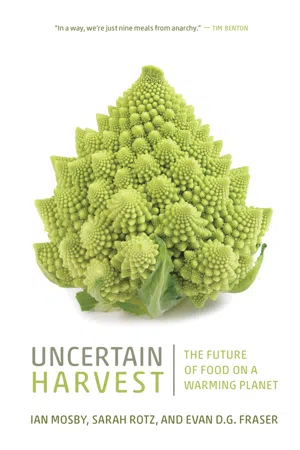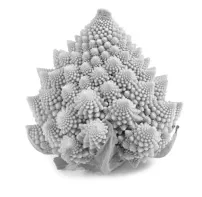![]()
Uncertain
Harvest
The Future of Food
on a Warming Planet
Ian Mosby,
Sarah Rotz, and
Evan D.G. Fraser
© 2020 University of Regina Press
All rights reserved. No part of this work covered by the copyrights hereon may be reproduced or used in any form or by any means—graphic, electronic, or mechanical—without the prior written permission of the publisher. Any request for photocopying, recording, taping or placement in information storage and retrieval systems of any sort shall be directed in writing to Access Copyright.
Printed and bound in Canada at Friesens. The text of this book is printed on 100% post-consumer recycled paper with earth-friendly vegetable-based inks.
Cover art: Romanesque cauliflower isolated on white background by scisettialfio / iStockphoto
Cover design: Duncan Campbell, University of Regina Press
Interior design: John van der Woude, jvdw Designs
Copy editor: Dallas Harrison
Proofreader: Rhonda Kronyk
Indexer: Patricia Furdek
Library and Archives Canada Cataloguing in Publication
Title: Uncertain harvest : the future of food on a warming planet / Ian Mosby, Sarah Rotz, and Evan D.G. Fraser.
Names: Mosby, Ian, 1980- author. | Rotz, Sarah, 1986- author. | Fraser, Evan D. G., author.
Series: Digestions (Regina, Sask.)
Description: Series statement: Digestions | Includes bibliographical references and index.
Identifiers: Canadiana (print) 20200170686 | Canadiana (ebook) 20200170740 | isbn 9780889777224 (hardcover) | isbn 9780889777200 (softcover) | isbn 9780889777248 (pdf) | isbn 9780889777262 (html)
Subjects: lcsh: Food. | lcsh: Global warming.
Classification: lcc tx353 .m67 2020 | ddc 641.3—dc23
10 9 8 7 6 5 4 3 2 1
University of Regina Press, University of Regina
Regina, Saskatchewan, Canada, s4s 0a2
tel: (306) 585-4758 fax: (306) 585-4699
web: www.uofrpress.ca
We acknowledge the support of the Canada Council for the Arts for our publishing program. We acknowledge the financial support of the Government of Canada. / Nous reconnaissons l’appui financier du gouvernement du Canada. This publication was made possible with support from Creative Saskatchewan’s Book Publishing Production Grant Program.
Contents
Acknowledgements
Preface: Recipes for the Future of Food
Introduction: Algae
Chapter 1: Caribou
Chapter 2: Kale
Chapter 3: Millet
Chapter 4: Tuna
Chapter 5: Crickets
Chapter 6: Milk
Conclusion: Rice
Notes
References
About the Authors
Acknowledgements
We are tremendously grateful to the many people who have supported us in developing this manuscript.
First, we thank the staff and students who helped with various aspects of this project, in particular Emily Duncan, Rachel Lee, Evan Gravely, and the many others who braved eating bugs and drinking Soylent in the name of “research.”
Second, we thank the participants whom we interviewed for this book. We are grateful for your time and wisdom; we have learned a great deal from you, and we hope we have captured your thoughts and inputs faithfully.
Third, we thank the anonymous peer reviewers and Dr. David Fraser from the University of British Columbia, who provided extremely helpful comments and edits on previous drafts of this book.
Fourth, this book in some ways reflects and draws on work funded by a range of institutions, including the Weston Seeding Food Innovation program, the Arrell Family Foundation, sshrc, the Canada Research Chair Program, and the Canada First Research Excellence Program. We are so thankful for this support as, without it, this work would never have been possible.
And fifth, we thank our families, friends, and communities, who have supported us along this journey.
We are extremely grateful to all of these individuals and groups, but all mistakes and errors in this book are our own and in no way should reflect on anyone who has helped us on our journey preparing it.
Preface
Recipes for the Future of Food
We all hope for a better food future: a future free from hunger, a future where the world has collectively managed to respond to climate change before it can spiral out of control, and a future where the way we produce food doesn’t come at the expense of the health of our waters, soils, and bodies. Deep down, though, those of us who study food for a living know things have the potential to get really, really bad.
This was partly why our pleasant lunch conversation in October 2017 with Tim Benton—the former uk global food security champion, a current professor of population ecology at Leeds University, and a director at Chatham House in London, uk—eventually turned toward the apocalypse. It all started lightheartedly. We chatted about the kinds of things we write about in this book—things such as robot farms, lab-grown meat, dna barcoding, and photosynthesis hacking—but Benton was keen to remind us a lot can go wrong with the food system well before the robot tractors become sentient and rise up against humanity.1
“In a way, we’re just nine meals from anarchy,” Benton told us as we munched on mediocre but filling pub food at a local Guelph restaurant. He was referring to an old saying by American journalist Alfred Henry Lewis but recalled, for the table, a conversation he’d had with a former central banker in Singapore who, after the 2008 financial collapse, converted over 10 percent of his wealth into gold coins. The idea was that, if the banking system really did collapse (as he and many others predicted), then “small bits of wealth like jewellery and gold coins would be more useful for bartering in a way that houses and cars can’t.”
It’s a frightening thought. Most economic transactions, after all, happen on a spreadsheet, on credit, and often without any real physical goods changing hands. What would happen, then, if the institutions we rely on to pay for the massive container ships or the planes, trains, and trucks that currently move most of the world’s food from far-flung sites of production to our grocery stores simply stopped functioning? “Well,” Benton suggested, “most cities have something like a three-day supply of food on hand at any given time. About enough for nine meals.”
For Benton, though, it’s not just that the food system is susceptible to a global economic crisis of the kind that nearly brought the global financial system to its knees in 2008. It’s also that the complex web of imports and exports that makes up our current international food system itself looks a lot like the global banking system just before the 2008 crash. It’s a system in which a few nations supply a disproportionate quantity of food to the rest of the world; in which a few major global transportation nodes such as the Suez Canal and Singapore facilitate much of the world’s food trade; in which eight crops (wheat, rice, corn, sugar, barley, soy, palm, and potato) provide three-quarters of the world’s calories; and in which a handful of multinational corporations (the abcd traders: Archer Daniels Midland, Bunge, Cargill, and Louis Dreyfus) control up to 90 percent of the world’s grain trade.2
It doesn’t take much to imagine a scenario in which something might happen to disrupt one of the major links of this global food commodity chain, whether it’s war, drought, natural disaster, or another global banking crisis. Benton suggested that it would “knock throug...






